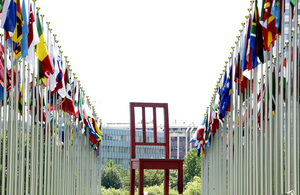World news story
This statement was delivered by the delegations of Egypt and Burkina Faso on behalf of over 100 countries including the UK, UNFPA and UNICEF.

The Human Rights Council takes place in Geneva.
FGM is a violation of human rights adversely affecting women and girls psychologically and physically, and governments and civil society must work together to accelerate the elimination of this practice. We strongly agree that FGM is a harmful practice and cannot be justified on religious or cultural grounds.
The harmful and dangerous impact of FGM on the health of young girls is well proven. Eliminating FGM will have a positive impact not only on the health, education and gender equality but also on the empowerment and full development of women and girls and of society as a whole.
Nevertheless, we are deeply concerned that the progress in reducing the prevalence of FGM hasn’t been up to the expectations.
Raising awareness of the adverse health consequences of FGM alone won’t end the practice, and if this information is not communicated sensitively it can promote medicalization of FGM, on both the demand and supply sides. Moreover, there is no evidence that medicalizing FGM reduces immediate or long-term complications associated with the practice.
We call on all stake holders to stop medicalization of FGM with actions aligned with the Global Strategy to stop health-care providers from performing FGM, including through the following:
- Establishing health policies and protocols advocating for the elimination of FGM.
- Incorporating, more systematically, content on FGM prevention and management of health complications.
- Empowering and enabling health-care workers to be agents of change.
- Creating networks between professional associations and unions of health-care service providers and religious leaders to clarify that FGM is not a religious practice.
- Improving person-centered communication skills of health-care professionals.
- Reinforcing the unethical nature of the medicalization of FGM by issuing public statements and protocols, establishing codes of conduct and instituting accountability mechanisms.
- empowering and enabling other forms of accountability mechanisms, such as parliamentary groups, National Human Rights Institutions and social accountability mechanisms.
Thank you.
Published 23 June 2021
Follow this news feed: HM Government





